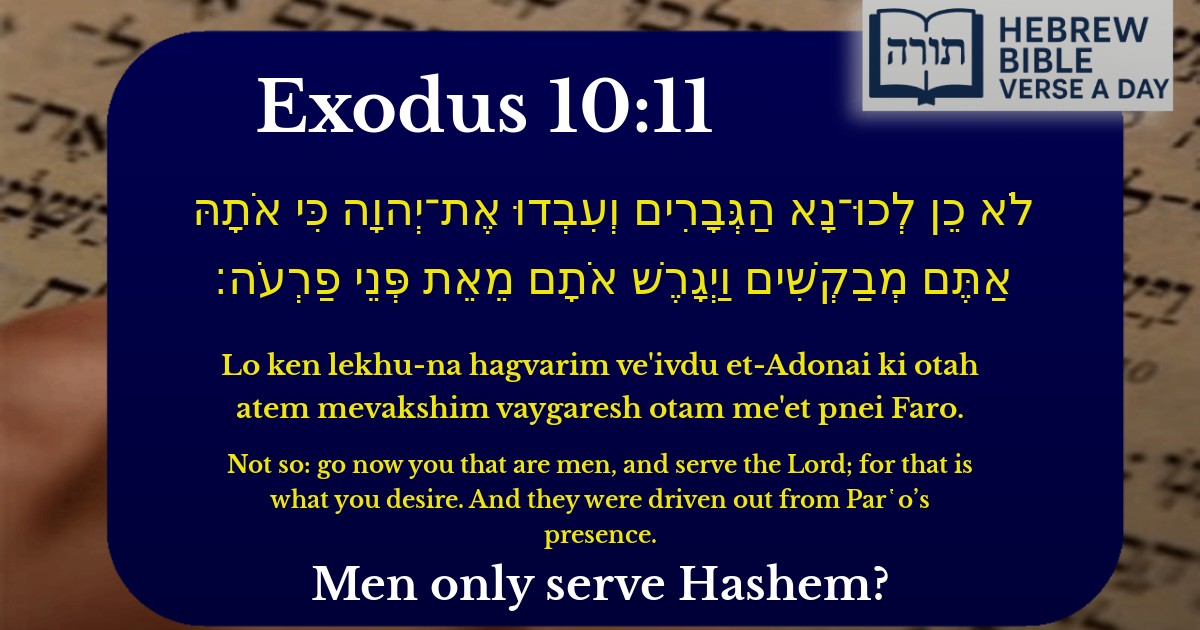Join Our Newsletter To Be Informed When New Videos Are Posted
Join the thousands of fellow Studends who rely on our videos to learn how to read the bible in Hebrew for free!
Hebrew Text
לֹא כֵן לְכוּ־נָא הַגְּבָרִים וְעִבְדוּ אֶת־יְהוָה כִּי אֹתָהּ אַתֶּם מְבַקְשִׁים וַיְגָרֶשׁ אֹתָם מֵאֵת פְּנֵי פַרְעֹה׃
English Translation
Not so: go now you that are men, and serve the Lord; for that is what you desire. And they were driven out from Par῾o’s presence.
Transliteration
Lo ken lekhu-na hagvarim ve'ivdu et-Adonai ki otah atem mevakshim vaygaresh otam me'et pnei Faro.
Hebrew Leining Text
לֹ֣א כֵ֗ן לְכֽוּ־נָ֤א הַגְּבָרִים֙ וְעִבְד֣וּ אֶת־יְהֹוָ֔ה כִּ֥י אֹתָ֖הּ אַתֶּ֣ם מְבַקְשִׁ֑ים וַיְגָ֣רֶשׁ אֹתָ֔ם מֵאֵ֖ת פְּנֵ֥י פַרְעֹֽה׃ <span class="mam-spi-samekh">{ס}</span>
לֹ֣א כֵ֗ן לְכֽוּ־נָ֤א הַגְּבָרִים֙ וְעִבְד֣וּ אֶת־יְהֹוָ֔ה כִּ֥י אֹתָ֖הּ אַתֶּ֣ם מְבַקְשִׁ֑ים וַיְגָ֣רֶשׁ אֹתָ֔ם מֵאֵ֖ת פְּנֵ֥י פַרְעֹֽה׃ {ס}
🎵 Listen to leining
Parasha Commentary
📚 Talmud Citations
This verse is not quoted in the Talmud.


Context of the Verse
The verse (Exodus 10:11) occurs during the negotiations between Moshe and Pharaoh regarding the Israelites' request to leave Egypt to serve Hashem. Pharaoh initially refuses to allow all of Bnei Yisrael to depart, insisting that only the men may go while the women and children remain behind.
Pharaoh's Stubbornness and Deception
Rashi explains that Pharaoh's words, "לֹא כֵן" ("Not so"), reflect his stubborn refusal to comply with Moshe's demand. Pharaoh attempts to deceive by offering a partial concession—allowing only the men to leave—while keeping the families as hostages to ensure their return. This reveals his true intention: to prevent the Israelites from serving Hashem entirely.
The Limitation to "הַגְּבָרִים" (The Men)
The Midrash (Shemot Rabbah 13:3) highlights that Pharaoh's restriction to only the men was a tactic to undermine the spiritual mission. True service of Hashem requires the participation of the entire nation, including women and children, as they are integral to the covenant. The Ramban (Nachmanides) adds that Pharaoh sought to prevent the transmission of faith to future generations by keeping the families in Egypt.
"כִּי אֹתָהּ אַתֶּם מְבַקְשִׁים" (For That Is What You Desire)
Ibn Ezra interprets Pharaoh's statement as an accusation: he claims Moshe and Aharon are using the pretext of serving Hashem as a ruse to escape slavery entirely. The Malbim, however, suggests that Pharaoh acknowledges their sincerity but still refuses, demonstrating his hardened heart.
The Expulsion from Pharaoh's Presence
The phrase "וַיְגָרֶשׁ אֹתָם" ("And they were driven out") is emphasized by the Sforno, who notes that Pharaoh's anger led him to dismiss Moshe and Aharon abruptly, signaling his complete rejection of their request. This foreshadows the escalation of the plagues, as Pharaoh's obstinacy brings further divine retribution.
Key Lessons from the Verse